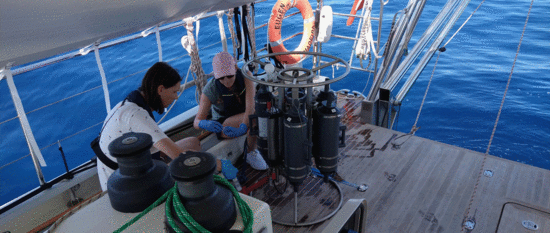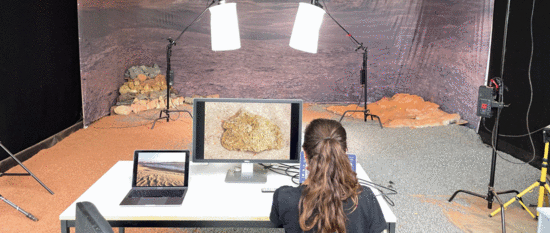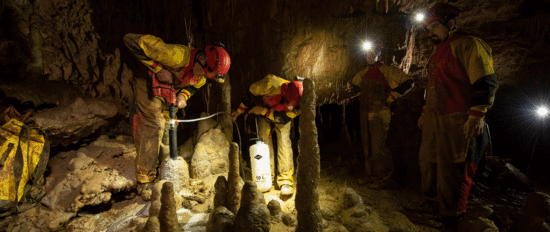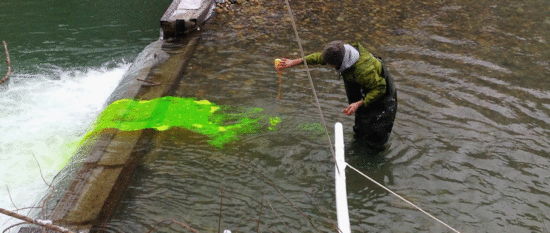MSc Geosciences at the University of Basel
The master's studies in Geosciences at the University of Basel provide a sound and practical training. The main topics are global change, land use change, natural hazards, sustainability, aquatic ecology, geoecology and soil ecology. In addition to the chosen specialization, other subject areas can also be studied, so that on the one hand a subject breadth and on the other hand an individual focus is possible.
The master's studies generally last 3 semesters, comprise 90 CPs and requires a bachelor’s degree with 180 credit points from a higher education institution recognized by the University of Basel.
Practical master's thesis
The studies of the MSc Geosciences do not only take place in the lecture hall, but also outside or in the laboratory. During your master's thesis, you will learn to plan and carry out your own research project and present the results in written form.
Networked thinking
Networked thinking is a prerequisite for understanding Geosciecnes, which passes through air, water, soil and rock. In this degree program, you will deepen your knowledge of the spheres, become more familiar with the effects of humanity on the spheres and learn a networked way of thinking that will also be of great benefit in your later professional life.
Current learning content
The latest research findings are incorporated into the courses. During your Master's thesis, you will also be part of a research group and gain an insight into current basic research and applied environmental research.
Personal support
During your master's thesis, you will be part of a research group and benefit from direct contact with the scientists: The lines of communication are short and there is always a pending ear for the students' concerns.
Diverse career prospects
A Master's degree in geosciences opens up a wide range of career opportunities. Be it in the private sector, in public administration or with NGOs. The MSc degree also qualifies you for doctoral studies.
Study in Basel
Basel is an ideal place for studies: housing is affordable, the university can be reached by bike or public transport within a short time and there is a vibrant cultural offering.
Key data | |
| Degree | Master's degree |
| Type | Degree program |
| Start date | Fall or spring semester |
| Regular periods of studies | 3 semesters |
| Credits | 90 |
| Course language | German/English |
Admission requirements |
With a BSc in geosciences from the University of Basel, admission is granted without additional requirements. Admission for all other prospective students requires a motion presented by the relevant examination commission, recommending that the President’s Board either allow or deny admission. Information on admissions: |
Dates and deadlines |
| All dates of the University of Basel |
Responsible faculty |
| Faculty of Science |
Study Administration Office Geosciences
Yvonne Steiner Ly
Klingelbergstr. 27, 1st floor, rm 1-04
4056 Basel
Office hours, Mo-Fr, 9-12.15 am
Consultation by appointment
Tel: +41 (0)61 207 36 45
Qualification profile MSc Geosciences (in german only)
MSc Geosciences study program, valid for all students with starts of program from HS21 onwards (in german only)
The HS21 guidelines apply to all students who have started their studies since the fall semester 2021. These guidelines were updated as of HS25:
Guidelines MSc Geosciences datet May 27, 2025
Old versions:
Guidelines MSc Geosciences dated June 25, 2024 (in german only)
Guidelines MSc Geociences dated May 25, 2021 (in german only)
The master's studies in Geosciences include a master's thesis. This thesis is the most important part of the master's studies and comprises academic achievements amounting to 45 CPs.
The choice of subject for the master's thesis, its scope and other criteria should be discussed with the future supervisor as early as possible. The supervisor also determines whether specific courses must be attended before beginning the master's thesis.
The master's thesis must be supervised by a supervisor approved by the teaching commission Geosciences. It is also possible to write a master's thesis outside the University of Basel, but expert supervision by one of the approved supervisors is a prerequisite.
Once the subject and scope have been determined, the next step is to complete a master's thesis learning contract . The master's thesis learning contract/agreement must be drawn up before the master's thesis begins. Take care to record a realistic duration of the master's thesis, as a written request for an extension is required if this is not adhered to. This must be submitted to the Geoscience Student Administration Office for geosciences and includes a justification, the old and new submission dates and the signatures of the student and supervisor.
Formalities: Thedeclaration of scientific integrity must be included as the last page of the master's thesis. When asked whether this thesis or parts of it will be published, check "YES" and enter the date of submission of the bound copy.
Specimen copies: At least one copy goes to the library of the respective supervisor for archiving - further bound copies may go to the supervisor. Please do not ring bind the written work. For further information see our guidelines or the websites of the research groups.
Please also note the information sheet on plagiarism from the Office of the Dean of Studies. Please contact your supervisor concering the use of AI tools.
Completion of the master's thesis: The assessed learning contract/agreement for the master's thesis, the assessment forms for the master's thesis and a copy of the title page must be submitted to the Geosciences Student Administration Office after completion of the master's thesis. The submission must be made by the Thursday before the start of lectures at the latest, so that further matriculation is no longer necessary, see the provisions on matriculation requirements for coursework and examinations . Students must agree the submission deadline with their supervisor accordingly. The supervisor should carry out the assessment no later than 6 weeks after the submission of the thesis. As soon as the two Master's examinations have also been completed and assessed, the degree completion documents are sent to the Office of the Dean of Studies at the Faculty of Sciences for the purpose of preparing the degree completion documents.
Assessment formats in general
Course registration in the online services (MOnA) is a prerequisite for the acquisition of credit points.
Examinations take the form of course-related assessment formats. By registering for the course in MOnA, you are automatically registered for the examination. Unless it is a core lectures, this type of course requires a special application via the Office of the Dean of Studies. Further information on the main lecture exams at the Faculty of Phil-Nat. can be found on the website of the Office of the Dean of Studies: https: //philnat.unibas.ch/de/examen/
For inspections, please refer to theinformation sheet Inspections.
Master's examinations
The master's studies in earth sciences also include two oral master's examinations. The content of the Master's examinations goes beyond the content of individual courses. The aim of these examinations is to document an interdisciplinary understanding of the respective key topics.
Examination I (major Master's examination, 45 minutes, 6 CP) takes place in the chosen specialization of the Master's studies. Examination II (small Master's examination, 30 minutes, 4 CP) should be taken in one of the other specializations. In any case, however, the examinations must be conducted by different examiners. The list of approved examiners can be found here.
Students arrange an appointment with the examiners in good time and then register for the examination in writing with the Earth Sciences degree program office. This application should be made at least 3 weeks before the examination date. For further information, see guidelines.
No declaration of intent is required to complete the master's studies. However, it is recommended that a module assignment be sent to the Earth Sciences Registrar's Office for review prior to the start of the lecture period of the final semester to ensure that all required courses have been completed or taken.
Please note:
Starts of program before HS21: Only courses from the three Geoscience modules may be credited in the modules "Specialization" and "Electives Earth Sciences". In the "Electives" module, students are absolutely free to choose. This means that Bachelor's courses or courses from other fields of study can also be credited.
Start of program from HS21: In the "Specialization module", only courses from the six specializations can be credited. In the "Free choice" module, Bachelor's courses or courses from other fields of study can also be credited.
As soon as the documents for the assessed master's thesis (in most cases this is the last academic achievement still to be completed) have been received by the Office of the Dean of Studies, these are submitted to the Office of the Dean of Studies together with the grade sheet for the master's examinations and the module assignment for the certificate. This means that no individual examination results, e.g. for the first oral Master's examination, are entered in MOnA in advance. The master's degree transcript is issued promptly, i.e. not just at the end of each semester. The date of issue corresponds to the date of the last academic achievement assessed.
The Master's graduation ceremony takes place once a year and is organized by the degree programme office. However, the degree transcripts are issued and sent out shortly after graduation. Date of the next Master's ceremony: May 9, 2025.




